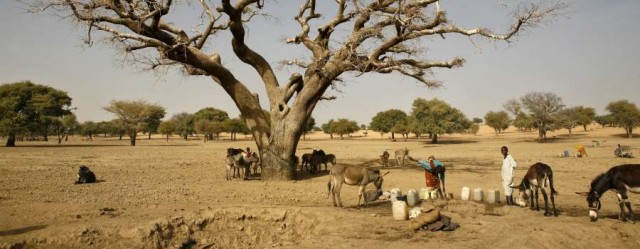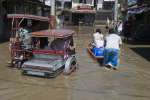Home > What We Do > Environment and Climate Change > Climate Change
Climate Change

The Storm Ahead
The Earth's climate is changing at a rate that has exceeded most scientific forecasts. Some families and communities have already started to suffer from the negative side of climate change, forced to leave their homes in search of a new beginning.
For UNHCR, the consequences of climate change are enormous. Scarce natural resources such as drinking water are likely to become even more limited. Many crops and some livestock are unlikely to survive in certain locations if conditions become too hot and dry, or too cold and wet. Food security, already a significant concern, will become even more challenging.
People will have to try and adapt to this situation, but for many this will mean a conscious move to another place to survive. Such moves, or the adverse effects that climate change may have on natural resources, may spark conflict with other communities, as an increasing number of people compete for a decreasing amount of resources.
In addition to working on vital human rights issues relating to population displacement induced by climate change, UNHCR will adapt much of its environment-related planning and work to address the effects of climate change.
 Planned relocation and UNFCCC
Planned relocation and UNFCCC
- Human Mobility in the context of Climate Change UNFCCC- PARIS COP-21. Recommendations from the Advisory Group on Climate Change and Human Mobility (November 2015)
- October 2015 recommendations to UNFCCC Parties from the Advisory Group on Climate Change and Human Mobility
- Planned relocation Guidance (October 2015)
- Climate Displacement and the Paris Agreement. Side Event UNFCCC, 3 June 2015, Bonn
- Climate change and human mobility solution agenda – Resilience – Paris COP 21
 Protection challenge in the context of Climate Change
Protection challenge in the context of Climate Change
- Volker Türk Discussion Forum on Climate Change, Berlin, 2014
- Second preparatory meeting of the 22nd OSCE. Session II: Cross-dimensional Impacts of Natural and Man-Made Disasters, Population movements in the context of natural disasters
- UNHCR Temporary Protection or Stay Arrangements, 2014
- Jane McAdam on UNHCR and Climate Change, 2013
- Session 2: International Cooperation and Respect for Human Rights. Seminar to Address the Adverse Impacts of Climate Change on the Full Enjoyment of Human Rights













